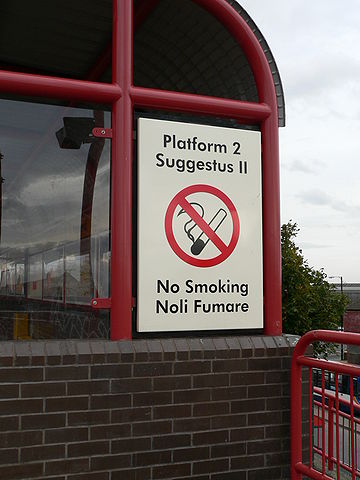
October 26, 2014, by Esther Eidinow
Why Latin is Not a Dead Language
Juliet O’Brien, a first-year student studying Ancient History and History at the University of Nottingham, explains why she thinks Latin still lives!
Latin is dead. Its decline has caused it painlessly to pass away in its sleep. It has been laid to rest in a stately marble tomb. RIP.
Rubbish! Latin still breathes. As long as there is civilisation, it will live on.
I study Latin as part of my degree at Nottingham, but I have been told more times than I care to count that Latin is now worthless because nobody speaks it anymore. I’ve tried various responses…. Sometimes I reply that it is the official language of the Vatican City. The usual retort is that Vatican City is a tiny state—but then I point out that the Pope himself is the spiritual leader of 1.2 billion Catholics worldwide and now via twitter he communicates directly with all of them, very often in Latin. Thus, this ‘dead language’ remains integral to the religious faith of billions.
Yet Latin is not just part of the Catholic heritage. The Pope may communicate with thousands in Latin, but English also owes much to Latin, the origin of everyday words such as ‘modesty’, ‘fame’ and ‘figure’. The same is true of many European languages, and for this reason Latin is also a practical tool for anyone learning to read or speak them.
Moreover, many of today’s key political concepts have their origins in Latin—e.g., libertas (liberty) and iustitia (justice). The architects of revolutions in the eighteenth and nineteenth centuries, frequently acknowledged their inspiration from the Classics. For example, Thomas Jefferson himself referred to Tacitus as the greatest writer ever. (And I can add that reading Tacitus’ Agricola, I am fascinated by his ideas of freedom and what it meant to be a ‘great man’ under tyrants.)
Latin also continues to have a practical purpose. Any student of Law or Medicine is expected to be familiar with technical Latin or even Greek terms. Do you know what your acromion is? Classics scholars can work out that it is on the end of your shoulder blade.
Of course, Latin has long been criticised as the preserve of the elite. But that is changing, with schemes such as the Cambridge School Classics Project’s Latin Course, now including the Cambridge Online Latin Project; this has helped to start Latin classes in 500 schools in the past 10 years. Far from dying out, slowly but surely Latin is spreading—becoming more and more accessible.
Thus we can see that far from being a dead language Latin is in fact in the ascendant. (There: another English word from a Latin stem!)
Image: One of the bilingual English and Latin signs at Wallsend Tyne and Wear Metro station.
Attribution: “Wallsend platfom 2 02” by Thryduulf – User created. Licensed under Creative Commons Attribution-Share Alike 4.0 via Wikimedia Commons – http://commons.wikimedia.org/wiki/File:Wallsend_platfom_2_02.jpg#mediaviewer/File:Wallsend_platfom_2_02.jpg.

It is not dead, merely immortal. It is no more a dead language than Chaucer or Shakespeare is dead literature.
Nice work, Juliet! I’m with Ian here: Latin is dead in the sense that we don’t speak it as we do modern languages, but alive inasmuch as we have a lively desire to read Vergil, Catullus, Cicero, Augustine, Aquinas, Newton, and have the opportunity and motivation to act upon that desire… (and the same goes for Greek — whence acromion!).
Hi
Please could someone help me in deciphering some accient Latin. That I recorded on a Paranormal investigation. Any help would be humbly appreciated
Thanks Alexis